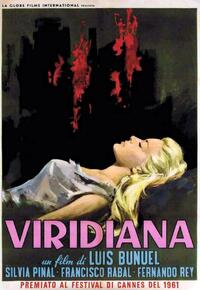- Work (Individual)
- 07. Ιστορία του Ευρωπαϊκού κινηματογράφου
- Έργα σχετικά με τα πρόσωπα ψηφιακής βιβλιοθήκης
- 17 May 1961 [1961 Cannes Film Festival]
- Ισπανικά
- Υπερρεαλισμός -- Κινηματογράφος -- Spain -- 20ος αιώνας
- Buñuel, Luis | Alejandro, Julio
- Buñuel, Luis
- Λογοκρισία των ταινιών | Δράμα
-
- nr98041479 ⟶ Viridiana (Madrid, Spain)
-
- Q852841 ⟶ Viridiana
-
- 300211471 ⟶ Viridiana (Madrid, Spain)
-
-
In the film, a novice nun is instructed to spend some time at the mansion of her reclusive uncle, her last living relative and main financial support. The uncle attempts to rape her, tries to convince her to live with him, and then commits suicide. Viridiana shares his inheritance with an illegitimate cousin, and decides against becoming a nun. Following a home invasion, the heiress is raped by one of the burglars. Saved by her cousin, the former nun agrees to make up a threesome with her cousin and his mistress.
⟶ Wikipedia
-
-
-
Banned in Spain and denounced by the Vatican, Luis Buñuel’s irreverent vision of life as a beggar’s banquet is regarded by many as his masterpiece. In it, novice nun Viridiana does her utmost to maintain her Catholic principles, but her lecherous uncle and a motley assemblage of paupers force her to confront the limits of her idealism. Winner of the Palme d’or at the 1961 Cannes Film Festival, Viridiana is as audacious today as ever.
⟶ The criterion collection
-
-
-
Viridiana is a 1961 Spanish-Mexican comedy-drama film directed by Luis Buñuel and produced by Gustavo Alatriste. It is loosely based on the 1895 novel Halma by Benito Pérez Galdós. The film was the co-winner of the Palme d'Or at the 1961 Cannes Film Festival. In a 2016 poll of 350 experts organized by Spanish film magazine Caimán Cuadernos de Cine, it was voted the best Spanish film of all time, with 227 votes.
⟶ Wikipedia
-


